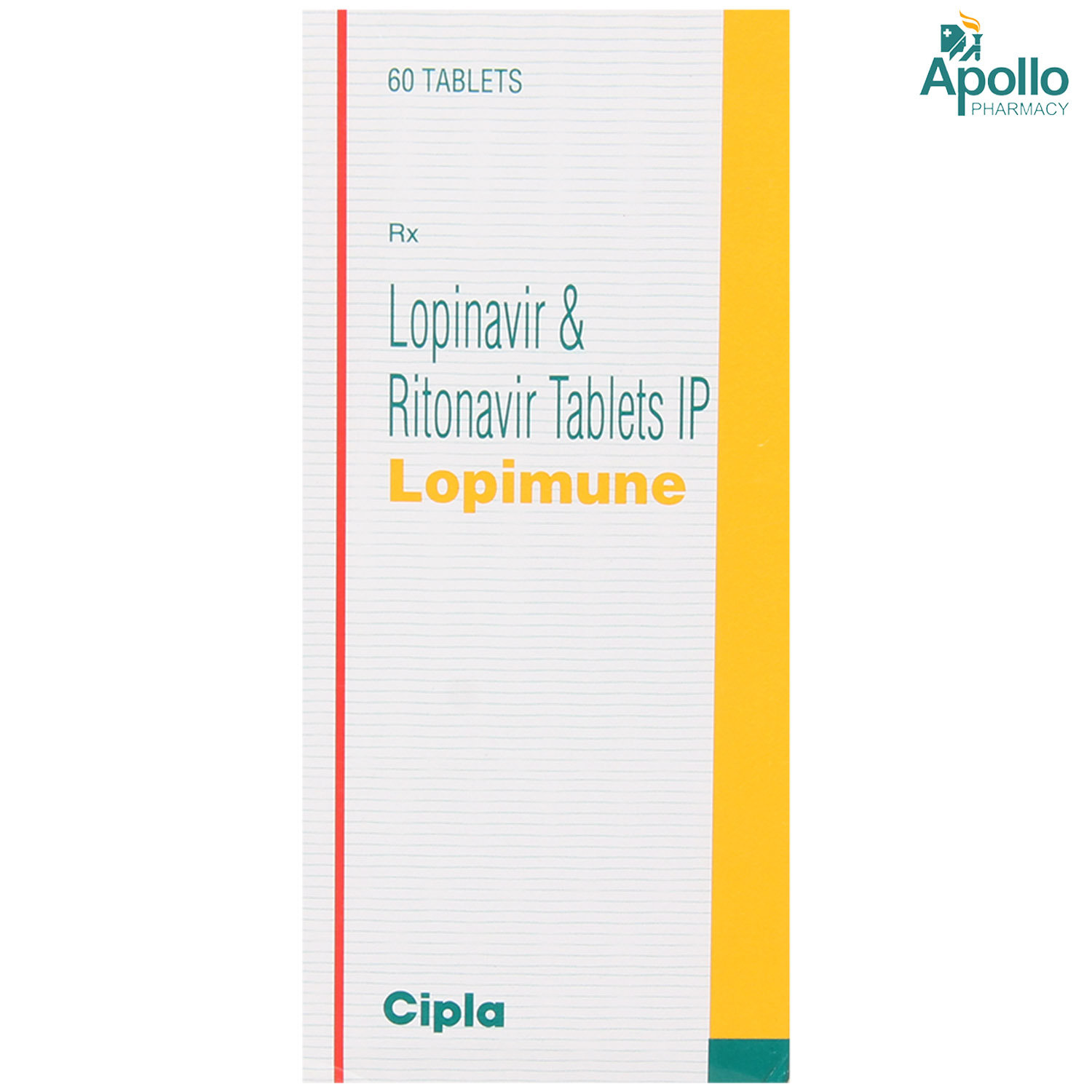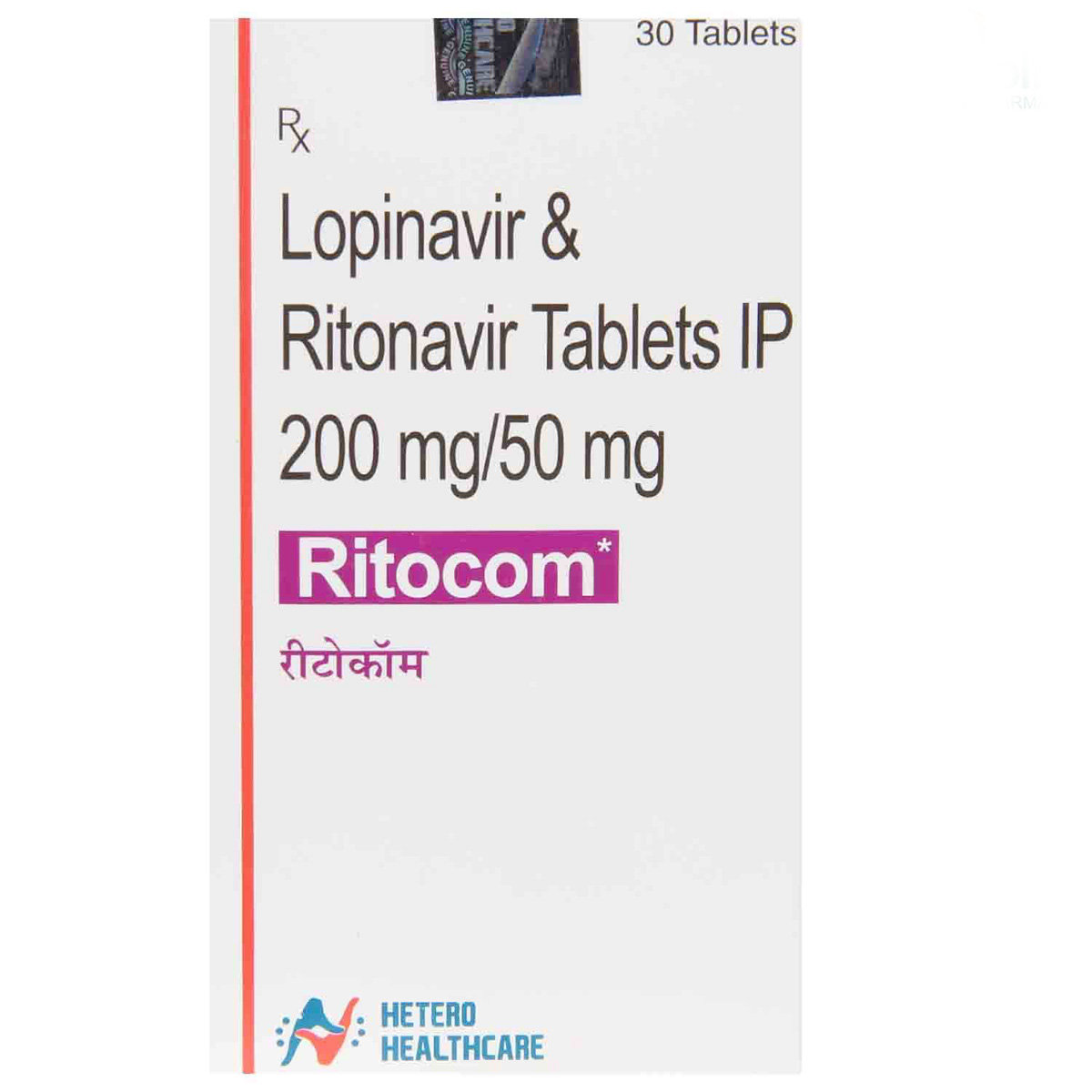Lopinavir+ritonavir
About Lopinavir+ritonavir
Lopinavir+ritonavir belongs to a class of drugs called antiretrovirals used in the treatment of HIV infection. Lopinavir+ritonavir helps in decreasing the chance of developing AIDS (acquired immunodeficiency syndrome). Lopinavir+ritonavir may be used in combination with other antiviral drugs. HIV (Human Immunodeficiency Virus) is a virus that attacks the immune system and destroys the white blood cells that help in fighting infection, making the individual susceptible to other infections or illnesses.
Lopinavir+ritonavir is a combination of two antiretroviral drugs, namely: Lopinavir and Ritonavir. Lopinavir works by inhibiting the working of a protease enzyme that is essential for the reproduction of HIV. Thereby, it prevents the production of the new virus. Ritonavir slows the breakdown of Lopinavir by the liver and increases the levels of Lopinavir in the blood and making it effective against the virus. Together, they help to control HIV infection.
Take Lopinavir+ritonavir as prescribed by your doctor. You are advised to take Lopinavir+ritonavir for as long as your doctor has prescribed it for you based on your medical condition. In some cases, you may experience nausea, vomiting, diarrhea, upper respiratory tract infection, indigestion, decreased appetite, headache, or dizziness. Most of these side effects of Lopinavir+ritonavir do not require medical attention and gradually resolve over time. However, if the side effects persist or worsen, please consult your doctor.
If you are allergic to Lopinavir+ritonavir or any other medicines, please tell your doctor. Lopinavir+ritonavir is not recommended for children below 2 years of age as the safety and effectiveness were not established. If you are pregnant, planning for pregnancy, or breastfeeding, please consult a doctor before taking Lopinavir+ritonavir. You are recommended to avoid the consumption of alcohol with Lopinavir+ritonavir as it may increase the risk of liver damage. Drive only if you are alert as Lopinavir+ritonavir may cause dizziness.
Uses of Lopinavir+ritonavir
Medicinal Benefits
Lopinavir+ritonavir contains Lopinavir and Ritonavir used in the treatment of HIV infection. Lopinavir+ritonavir may be used in combination with other antiviral drugs. Lopinavir inhibits the working of the protease enzyme that is essential for the reproduction of HIV. Thereby, it prevents the production of the new virus. Ritonavir slows the breakdown of Lopinavir by the liver and increases the levels of Lopinavir in the blood and making it effective against the virus. Together, they help to control HIV infection by slowing the spread of infection in the body. Taking Lopinavir+ritonavir along with practicing safe sex and lifestyle changes may reduce the risk of getting or transmitting HIV to others.
Directions for Use
Storage
Side Effects of Lopinavir+ritonavir
- Nausea
- Vomiting
- Diarrhoea
- Upper respiratory tract infection
- Indigestion
- Decreased appetite
- Headache
- Dizziness
Drug Warnings
If you are allergic to Lopinavir+ritonavir or any other medicines, please tell your doctor. Lopinavir+ritonavir is not recommended for children below 2 years of age as the safety and effectiveness were not established. If you are pregnant or planning for pregnancy, please consult a doctor before taking Lopinavir+ritonavir. HIV-infected women are recommended to avoid breastfeeding as the baby may be infected through breast milk. Please consult a doctor if you are breastfeeding before taking Lopinavir+ritonavir. You are recommended to avoid consumption of alcohol with Lopinavir+ritonavir as it may increase the risk of liver damage. Drive only if you are alert as Lopinavir+ritonavir may cause dizziness. You are advised to take proper precautions if you are infected with HIV infection to prevent the spread of infection to others through sexual contact or body fluids. If you experience stomach pain, difficulty in breathing, vomiting, nausea and severe weakness in the muscles of arms and legs, please consult a doctor immediately as these might be symptoms of increased lactic acid levels.
Drug Interactions
Drug-Drug Interaction: Lopinavir+ritonavir may interact with anti-allergic drugs (astemizole, terfenadine), antianxiety drugs (triazolam, midazolam), antipsychotics (quetiapine, pimozide), antidepressants (lurasidone), cholesterol-lowering medicines (simvastatin, lovastatin), antibiotics (fusidic acid), medicines used to treat erectile dysfunction (sildenafil, vardenafil, avanafil), antacid (cisapride), drugs used to treat abnormal heartbeat (dronedarone, amiodarone), medicines used to treat headaches (dihydroergotamine, methylergonovine, ergotamine, ergonovine).
Drug-Food Interaction: Lopinavir+ritonavir may interact with St. John’s wort (herbal medicine used to treat depression). Therefore, avoid taking Lopinavir+ritonavir with St. John’s wort.
Drug-Disease Interaction: Do not take Lopinavir+ritonavir if you have severe liver problems. If you have diabetes, high cholesterol, bleeding disorder, hemophilia type A or B, low levels of potassium in blood, pancreas, liver or heart problems, inform your doctor before taking Lopinavir+ritonavir.
Drug-Drug Interactions Checker List:
Safety Advice

Alcohol
unsafeAvoid alcohol consumption with Lopinavir+ritonavir as it may increase the risk of liver damage.

Pregnancy
cautionLopinavir+ritonavir is given to pregnant women only if the doctor thinks benefits outweigh risks. Please consult a doctor if you are pregnant or planning for pregnancy.

Breast Feeding
cautionBreastfeeding mothers are not recommended to take Lopinavir+ritonavir unless advised by a doctor. Therefore, please consult a doctor if you are breastfeeding.

Driving
cautionLopinavir+ritonavir may cause dizziness in some people. Therefore, avoid driving or operating heavy machinery if you feel dizzy after taking Lopinavir+ritonavir.

Liver
cautionTake Lopinavir+ritonavir with caution, especially if you have a history of Liver diseases/conditions. The dose may be adjusted by your doctor as required. Avoid taking Lopinavir+ritonavir if you have severe liver problems.

Kidney
cautionTake Lopinavir+ritonavir with caution, especially if you have a history of Kidney diseases/conditions. The dose may be adjusted by your doctor as required.

Children
cautionLopinavir+ritonavir is not recommended for children below 2 years of age as the safety and effectiveness were not established.
Habit Forming
Diet & Lifestyle Advise
- Practise safe sex by using condoms; it helps in reducing contact with semen and vaginal fluids.
- Never share personal items with body fluids or blood on them, such as razor blades or toothbrushes.
- Avoid sharing used needles, other injections, or drug equipment.
- Get tested for other sexually transmitted infections such as gonorrhea or syphilis as they can make you prone to HIV infection.
- Eat a healthy and balanced diet. Eat vitamin and nutrient-rich food such as dark green, yellow, orange, and red vegetables and fruits as it helps to boost your immune system. Opt for lean protein and whole grains.
- Avoid eating raw meat and eggs. Consume properly boiled and cooked meat, poultry, or seafood.
- Eat bland and low-fat foods and avoid spicy or oily foods if you experience nausea or vomiting.
- Try to reduce emotional and physical stress by spending time with family or doing whatever makes you happy.
Special Advise
Certain tests are recommended while taking Lopinavir+ritonavir to monitor the changes in levels of blood lipids and glucose.
Patients Concern
Disease/Condition Glossary
HIV infection: HIV (Human Immunodeficiency Virus) is a virus that attacks the immune system and destroys the white blood cells that help in fighting infection, making the individual susceptible to other infections or illnesses. People with HIV experience flu-like symptoms such as fever, chills, rash, night sweats, muscle aches, tiredness, and sore throat. These symptoms usually last for days to several weeks. HIV spreads through body fluids such as semen, vaginal fluid, and blood. If left untreated, this condition can lead to AIDS (Acquired Immunodeficiency Syndrome). It is a life-long condition, and there is no definite cure for it. However, it can be controlled by treating with antiretroviral drugs.
FAQs
Lopinavir+ritonavir contains Lopinavir and Ritonavir. Lopinavir works by inhibiting the working of a protease enzyme that is essential for the reproduction of the HIV virus. Thereby, it prevents the production of the new virus. Ritonavir slows the breakdown of Lopinavir by the liver and increases the levels of Lopinavir in blood and makes it effective against the virus. Together, they help to control HIV infection.
Lopinavir+ritonavir should be used with caution in diabetic patients as it may increase blood sugar levels. However, if you experience increased thirst or urination, weight loss or fruity breath smell while taking Lopinavir+ritonavir, please consult a doctor immediately as these might be signs of high blood sugar levels.
Lopinavir+ritonavir may cause bone problems such as osteonecrosis (death of bone tissue due to loss of blood supply to the bone) especially in HIV patients taking combination antiretroviral therapy. However, if you experience joint pains, stiffness (especially of shoulder, knee or hip) or difficulty in movement, please consult a doctor immediately.
HIV infection may still be transmitted to other persons while using Lopinavir+ritonavir. Lopinavir+ritonavir reduces the risk of transmission but still, HIV infection is contagious. Therefore, discuss with a doctor regarding precautions to be taken to avoid transmission of HIV while taking Lopinavir+ritonavir.
Lopinavir+ritonavir is not recommended for patients with severe liver problems including chronic hepatitis B or C infection as it may increase the risk of severe liver side effects. Therefore, inform your doctor if you have a history of any liver problems before taking Lopinavir+ritonavir.
Lopinavir+ritonavir does not cure HIV infection. Lopinavir+ritonavir reduces the amount of HIV virus in the body and improves the functioning of the immune system.







